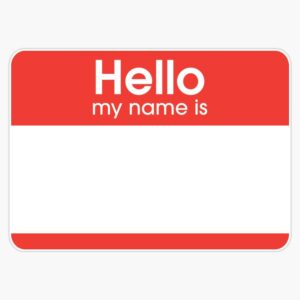 My first nickname was Awie, not the gooiest name as it falls onto the ear, but it was mine.
My first nickname was Awie, not the gooiest name as it falls onto the ear, but it was mine.
Brother #1, two years younger than me, came up with the name when he was first learning to talk and couldn’t navigate the L or R in Laura. Awie stuck with the durable adhesive of childhood nicknames even though it had a narrow circumference. Awie was solely a family circle name used by my brothers and sister and the herd of cousins and neighborhood friends who played together after school. It never radiated further than the hood and faded from use as we all fell prey to the self-consciousness of adolescence.
Nickname is from an Old English compound word from the 14th century, ekename, which means additional name. The word is a mashup of eac, meaning also and eacian, which means to increase. Two centuries later the word had morphed into nickname. Nickname, cognomen, moniker, handle, sobriquet, nom de plume, stage name, alias–we reroute our identities and create new ones in the tactile and digital worlds by switching up our name to establish anonymity, intimacy, hierarchy. While these language and naming conventions share some similar DNA, nicknames distinguish themselves with their informality. Most cultures have nicknames but their pragmatics are specific to the cultures and subcultures they appear in. For example, nicknames were celebrated in the Viking societies of yesteryear. Many people had heiti, an Old Norse term for nicknames (sometimes called placeholder names), which were often used instead of the first name. The giving of a nickname had a special status, creating a relationship between the nicknamer and the nicknamee. To honor the two, there was often a ceremony called nafnfestr, translated as a festival to fasten a name.
My family all had nicknames when we were kids. There were the baby talk manglings of our given names. My sister Julie was Googie; my grandmother became Gammo. There was the puzzling and kind of icky name my grandfather gave my brother Andrew—Scut—which did not get much traction because we had no idea what it meant or where it came from. My brother Pat gave himself the nickname of Mr. Fred BeeBeehead (a character entirely of his own creation), and my youngest brother Tim became Pomo after us kids made it up and into a singsong taunt to get him to jump into a swimming pool and play Marco Polo with us.
Although nicknames can carry the power to judge, assess and rank, when we were kids, we didn’t traffic in the meanspirited nicknames some kids in the neighborhood got that pointed to flaws or weaknesses. Our nicknames weren’t used to scapegoat or to taunt. We didn’t opt for the pre-fab nicknames like Junior, Chip, or Bud. And our nicknames weren’t snipped versions of our longer given names. That came later in early adulthood when Patrik became Pat, Timothy became Tim, and Andrew was shortened to Drew.
I am now decades away from my Awie days but still gladly under the influence of a jumble of nicknames: Zyshe, Pepper, Miss So and So, Noodle, Slecna, Musculos, Saucy, Lolly, Bunny Day, Grimsel, Fifi. In my kinships and friendships, my nicknames are markers of familiarity. They are secret coded language and active passwords into backstories of mirth and shenanigans. The nicknames I’ve received from sibs, friends, students and beloveds signify affinity, connection, and affection. They feel like a form of cuddling.
What I know about myself over the years is that I am also a nickname giver. Socio-onomastics, those who study the pragmatics of naming, say that nicknaming can be indicative of a power dynamic. By choosing to not use someone’s assigned name and giving them a nickname instead, the balance of power is tilted and dominance is displayed. Another variation of the psychological interpretations of nicknaming is its reflection of a bond, a suggestion of intimacy and a public declaration of connection between people.
I see myself deploy nicknaming much like I deploy teasing—as risky, surging advances toward connection. Nicknames are like totems of belonging to the people who claim you. I give them lovingly. And accept them willingly.

